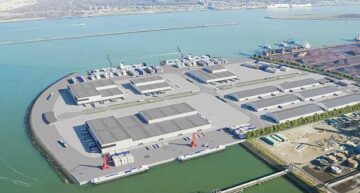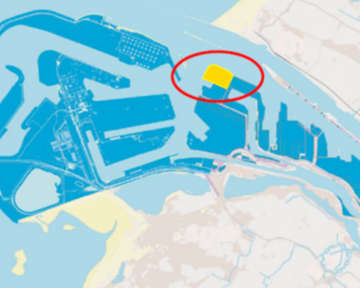Challenge(s)
How can port buildings help reduce waste and help better preserve biodegradable imports?
Good practice
Innovation and food quality
The Rotterdam Food Hub represents a pivotal innovation in the world of agrifood logistics, offering a state-of-the-art solution for storing perishable food. Established in 2019, this hub is strategically located at Maasvlakte's deep-sea container terminals, making it a central point for refrigerated cargo storage. Rotterdam's prominence as Europe's primary hub for reefer containers is fortified by its extensive infrastructure, boasting an impressive 18,500 reefer connections, ensuring the efficient and reliable transport of fresh goods. This innovative development aligns with the UN Sustainable Goal #9, emphasizing industry, innovation, and infrastructure.
This good practice also includes objective 8.2 (Revising the status of port and City Port heritage to properly reflect the site’s historical significance) of the AIVP's 2030 Agenda.
Case study
The Rotterdam Food Hub emerged as a solution to effectively facilitate agrifood companies from around the world. A new facility for storing perishable foodstuffs was completed in 2019 in the strategic location of the Maasvlakte’s deep-sea container terminals in close proximity to the port hub. The Rotterdam Food Hub boasts multiple parts specifically designed for refrigerated cargo, allowing access to sea-going vessels. Additionally, the hub features berths for inland vessels and warehouses will be strategically situated near the quays to enable quick storage, processing, and transportation of refrigerated and frozen goods.
The growth of the global population and increasing prosperity, particularly in emerging economies, have contributed to the agrifood sector becoming a thriving market. In 2017 alone, the country’s agricultural trade reached nearly €92 billion, establishing the Port of Rotterdam as the market leader in Western Europe with its annual throughput of 16 million tonnes.
The Port of Rotterdam holds a prominent status as Europe’s primary hub for the import and export of refrigerated and frozen cargo carried in reefer containers. With its stature as Europe’s largest container port, Rotterdam boasts comprehensive facilities and services designed to accommodate the smooth transportation of fresh products in reefer containers. In fact, Rotterdam’s container terminals offer a staggering 18,500 reefer connections, a number unparalleled anywhere else globally. This unrivalled infrastructure ensures that fresh goods can be efficiently transferred, safeguarding their quality.
Speed and reliability are pivotal in preserving the freshness of perishable products. Rotterdam shines in these aspects. Many intercontinental liner services designate Rotterdam as their initial port of call in Europe, emphasizing its efficiency and reliability in handling refrigerated cargo. Furthermore, Rotterdam’s strategic location, adjacent to vital horticultural areas like the Westland and Barendrecht Greenports, enhances its status as a critical gateway for fresh products. Additionally, its robust intermodal connections extend to other Greenport regions, such as Venlo, further cementing its position.
The Rotterdam Food Hub, operational since 2019, stands at the strategic crossroads of Maasvlakte’s deep-sea container terminals, providing specialized storage for perishable food. With 18,500 reefer connections and rapid handling, Rotterdam is Europe’s primary hub for refrigerated cargo, ensuring speedy, reliable, and high-quality fresh product transport. Such a technological innovation used in the port of Rotterdam complies with number 9 of the UN Sustainable Goals focusing on Industry, Innovation and Infrastructure as it enhances industrial technologies.
Additional informations :
Port of Rotterdam Authority launches ‘Rotterdam Food Hub’



